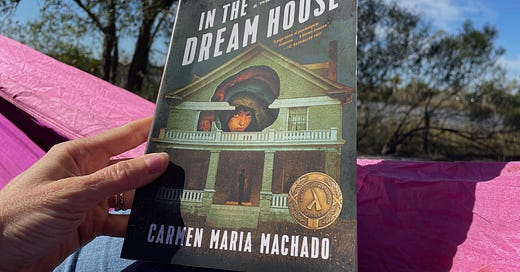In the Dream House, by Carmen Maria Machado
Topics: Domestic Abuse, Queer Relationships, Intimate Partner Violence
In the Dream House chronicles Carmen Maria Machado’s time in an abusive queer relationship and how she got out. I related to so much of this page-turner with short, immersive chapters. The reason I couldn’t put it down wasn’t because I was dying to find out what happens next. What pulled me forward was the anticipation of what I’d read next that would mirror and validate my own past experiences.
Much of Machado’s story is told in second person (you/your), an unconventional choice for memoir, and a deliberate technique by the author to create distance from and perspective on her past self. The effect this had on me as a reader is that I was easily able to slip my past self into her past self’s shoes, almost as if she was telling me my own story.
The narrative is chock-full of lines any survivor of a toxic relationship will recognize as hauntingly true, like:
“Many types of domestic abuse are completely legal.”
“...you swear to yourself that you’re going to tell someone how bad it is, you’re gonna stop pretending like none of this is happening…”
“You want an explanation that clears her of her responsibility, that permits your relationship to continue unabated.”
“Folks say nothing but Why didn’t you go / Why didn’t you run / Why didn’t you say? (Also: Why did you stay?)”
“You have forgotten that leaving is an option.”
You don’t have to be queer to appreciate this author’s singular experience. And for straight folx or those who are new to queer identity, you’ll appreciate the footnotes. Many offer glimpses into queer history and the author’s own thoughts. For example, Machado’s takeaway from a personal essay on abuse in a 1984 issue of Gay Community News points to a footnote on how “queer abuse feels like–is–homophobia, the same way abuse in heterosexual relationships feels like–is–sexism.”
As a memoirist myself, I was in awe of how Machado reclaims and rewrites traditional mythology and even invents her own to make meaning of and communicate her experience. By creating the fairytale of the Queen and the Squid, she aptly conveys feelings and truths found in specifics she can’t share due to legal/privacy concerns.
Why I love difficult stories like In the Dream House is because I know, against all odds, the author got out. She wouldn’t be writing her story if she was still in it. Her plot twist ending does not disappoint, nor is it saccharine. Machado keeps it real all the way through and proves there is always room for more stories. No one has ever told the narrative of abuse and liberation in her voice, and I’ll never tire of watching another person find theirs on the page.
Want This Memoir?
Consider purchasing from Femme Fire Books or your local independent bookstore.
Like This Memoir?
Read more from this author on Substack at Cup of Stars.
FYI, I earn a small commission on books purchased through any IndieBound links provided in posts. Links to Femme Fire Books are purely to support the growth of a store I want to see succeed.





Sold! I especially like how you describe the use of 2nd person. 🙏